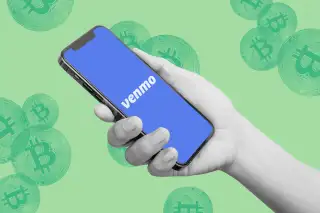You Can Buy Bitcoin on Venmo Now. Should You?

You can now buy and sell bitcoin on Venmo as easily as you can split a bar tab with friends.
On Tuesday, the mobile payment application began allowing users to buy, hold and sell four types of cryptocurrency with a minimum spending limit of just $1.
The move makes "cryptos" accessible to Venmo's more than 70 million customers at a time when digital assets are quickly becoming more mainstream. Just last week, Coinbase, the largest cryptocurrency exchange in the U.S., made its public debut, which many saw as a vote of confidence for digital currencies as a whole. Meanwhile, the price of Dogecoin, a Bitcoin spinoff that started as a joke, has skyrocketed this month.
Venmo is owned by PayPal, which has allowed people to buy and sell the four cryptocurrencies — Bitcoin, Ethereum, Litecoin and Bitcoin Cash — through its main platform since late last year, and started letting customers pay millions of online merchants with those cryptos last month. Cash App, another popular peer-to-peer digital payment service, also allows users to buy and sell bitcoin.
If you haven’t yet bought into the crypto mania, it just got a lot easier to do so. But should you?
Is it safe to buy and sell cryptocurrency on Venmo?
Cryptocurrency is risky since it isn't regulated like a traditional asset and its price is volatile. But if you've been looking for a way to dip your toes, this isn't the worst place to start.
The four cryptocurrencies available to Venmo users are among the safest, says Hanna Halaburda, an associate professor at NYU Stern School of Business. It's more expensive for hackers to attack the underlying blockchain technology of these types of cryptocurrencies, making them more secure.
The platform also matters. Cryptocurrency holders have been burned in the past thanks to unregulated exchanges. Mt. Gox was once the largest Bitcoin trading exchange in the world before it crashed in 2014 and its customers lost access to hundreds of millions of dollars. Another exchange, Quadriga, turned out to be a Ponzi scheme.
The platform that PayPal has partnered with to make these Venmo transactions possible, Paxos, is highly regulated, according to Halaburda.
Wading into the world of cryptocurrency comes with "inherent risk," she says. But "this is probably one of the safest options."
Will these transactions show up on Venmo's public feed?
Part of Venmo's shtick is that it lets you spy on other people's transactions and, if you want, share your own. Now, millions of Venmo users can easily buy and sell cryptocurrency and, just like any other social media platform, add the proof to their Venmo feed.
R.A. Farrokhnia, Columbia Business School professor and Executive Director of Columbia Fintech Initiative says this begs the question: Does the average investor fully understand how cryptocurrency works, or are people just “buying into the hype?”
After all, investing FOMO can make people act against their best interests, as we saw with the recent GameStop trading frenzy that led some traders to lose a ton of money. Will bringing Venmo into the crypto mix “gamify” buying and selling bitcoin — something Robinhood has been criticized for doing with day trading?
“Gamifying is a double-edged sword,” Farrokhnia says. If done right, it can make saving or paying bills on time a lot more fun. Done wrong, it could nudge people towards behavior that could hurt them in the long run.
On Venmo, customers will choose whether or not to share their crypto activity after they complete a transaction, a PayPal spokesperson told Money. For customers who do choose to share, that activity will default to sharing with Venmo "friends" only, even if their default privacy is normally set to "public." Dollar amounts won’t be visible to anyone but that person.
What's the worst-case scenario here?
Cryptocurrency is a largely unregulated asset, and in the grand scheme of things, it's also a new one.
Cryptocurrencies run on a decentralized network, meaning they can be bought and sold without the involvement of a bank, government or another third party. While that allows trades to happen quickly, it also means cryptocurrency’s future is uncertain. Earlier this year, Treasury Secretary Janet Yellen said that the U.S. government may need to “curtail” the use of cryptocurrencies over concerns that they're mainly used for “illicit financing.” Money has previously reported on concerns of Bitcoin potentially being outright banned, which would leave the fate of its traders up in the air.
The price is also volatile: Bitcoin’s value hit a record high in December of 2017 before falling 50% in the first month of 2018.
Like any risky investment, experts' advice on cryptocurrency is clear: Make sure any money you put down is money you'd be OK with losing.
More from Money:
What Is Bitcoin, and Why Do People Call It the New Gold?
A Beginner's Guide to Dogecoin, the Cryptocurrency That Started as a Joke and Is Now Worth Billions
Coinbase Stock Is the Latest Way to Bet on Cryptocurrency. Here Are the Pros and Cons